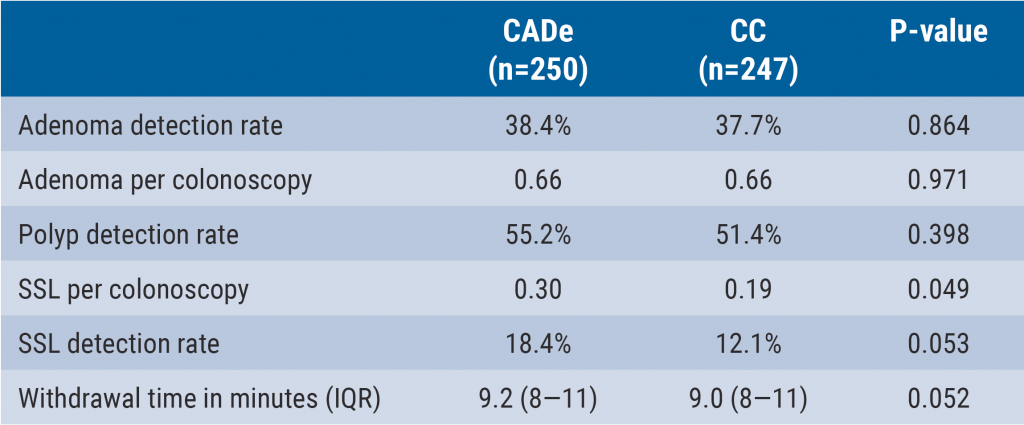https://doi.org/10.55788/c89ed34f
“Currently, most patients with IBS do not receive adequate treatment,” said Ms Linda Weißer (HiDoc Technologies GmbH, Germany) [1]. “Digital therapeutics may help close the healthcare gap by providing guided self-help for chronic conditions such as IBS.” The current study randomised 378 participants with IBS (80.7% of which were women) to a DiGA intervention or to a control intervention, which comprised a modified sham app. The DiGA intervention included an in-app symptom journal and a personalised treatment plan, with nutrition therapy and various psychotherapy modalities. The investigators used the IBS Severity Scoring System (IBS-SSS), the IBS-QOL questionnaire, the Work Productivity and Activity Impairment (WPAI)-IBS questionnaire, and the European Health Literacy Survey (HLS-EU-Q16) to assess the efficacy of the intervention.
After 12 weeks of intervention, participants who used DiGA significantly improved all the assessed efficacy outcomes, including symptom severity, QoL, work productivity impairment, activity impairment, and health literacy.
Ms Weißer added that 70.2% of the participants in the experimental arm had a clinically relevant improvement of symptoms, compared with 33.2% of the participants in the control group (OR 4.87; 95% CI 3.12–7.60; P<0.001). Also, 70.8% of the participants in the active intervention arm had a clinically meaningful improvement in QoL, compared with 19% of those in the control group (OR 10.70; 95% CI 6.55–17.49; P<0.001).
“The assessed DiGA intervention was largely effective in participants with IBS, improving situations from disease symptoms to work productivity, without interference from a healthcare practitioner,” concluded Ms Weißer.
- Weißer LM, et al. The effectiveness of an App-based digital therapeutic for irritable bowel syndrome: results of a randomised controlled trial. LB17, UEG Week 2023, 14–17 October, Copenhagen, Denmark.
Copyright ©2023 Medicom Medical Publishers
Posted on
Previous Article
« GastroGPT: Successful proof-of-concept study of gastroenterology-specific large language model Next Article
Should we use E-SEMS or EVT for traumatic oesophageal perforations? »
« GastroGPT: Successful proof-of-concept study of gastroenterology-specific large language model Next Article
Should we use E-SEMS or EVT for traumatic oesophageal perforations? »
Table of Contents: UEGW 2023
Featured articles
SEQUENCE: Risankizumab doubles endoscopic remission rates compared with ustekinumab in CD
What’s New in Artificial Intelligence
Digital intervention relieves symptoms and improves QoL in IBS
GastroGPT: Successful proof-of-concept study of gastroenterology-specific large language model
Other Therapeutics and Outcomes
Primary results from MAESTRO-NASH trial: resmetirom efficacious for NASH
Apraglutide: Advancing the treatment of short bowel syndrome
Endobiliary radiofrequency ablation in pCCA: a pilot study
Raising awareness for microscopic colitis: disease course and predictors
Outcomes of IBD Trials
DIVERSITY1: Filgotinib results in Crohn’s disease leave investigators puzzled
SEQUENCE: Risankizumab doubles endoscopic remission rates compared with ustekinumab in CD
Guselkumab provides benefits in UC regardless of advanced therapy history
INSPIRE: Risankizumab meets all efficacy endpoints in UC
Risankizumab resolves extraintestinal manifestations in CD
Obefazimod takes the spotlight as promising UC treatment
Rapid response to upadacitinib boosts outcomes in severe Crohn’s disease
LUCENT trials: Mirikizumab works in UC, regardless of targeted therapy history
ARTEMIS-UC: New kid in town for UC
Breakthroughs in Colorectal Lesions
Safer removal of large polyps with cold snare technique
Higher recurrence rates with cold snare EMR than with conventional EMR
How to deal with at-risk patients above the CRC screening age limit?
European CRC screening needs to be revised
Advances in Upper Endoscopy and Colonoscopy
Epinephrine boosts efficiency in gastric ESD
Artificial intelligence-aided colonoscopy did not improve outcomes in Lynch syndrome
Can computer technology improve our everyday colonoscopy results?
Is AI-assisted colonoscopy ready for clinical practice?
Should we use E-SEMS or EVT for traumatic oesophageal perforations?
Related Articles

December 7, 2023
Can computer technology improve our everyday colonoscopy results?
December 7, 2023
Epinephrine boosts efficiency in gastric ESD
December 7, 2023
Is AI-assisted colonoscopy ready for clinical practice?
© 2024 Medicom Medical Publishers. All rights reserved. Terms and Conditions | Privacy Policy
HEAD OFFICE
Laarderhoogtweg 25
1101 EB Amsterdam
The Netherlands
T: +31 85 4012 560
E: publishers@medicom-publishers.com

